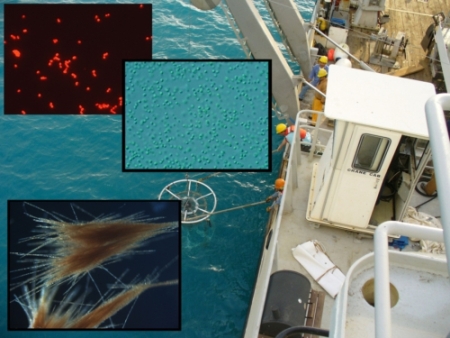Researchers belonging to the Bermuda Institute of Ocean Sciences (BIOS) and Princeton University have together conducted a study on the impact of climate change on bacteria.

At-sea
ocean acidification experiments show contrasting responses between dominant unicellular and colonial natural cyanobacteria populations. Insets(top to bottom): Synechococcus (epifluorescent microscopy), Prochlorococcus(bright-field microscopy) and Trichodesmium (bright-field microscopy). Photos: S. Jaeger and M. Lomas. (PRNewsFoto/Bermuda Institute of Ocean Sciences, S. Jaeger and M. Lomas)
Acidification of the ocean has been continuing from around 120,000 years ago – the last glacial minimum age. The research team studied the responses of photosynthetic bacteria to treatments that simulated the trends of ocean acidification from the early period to the year 2100.
The PI of the Phytoplankton Ecology Lab at BIOS, Dr. Michael Lomas, led the research team. Dr. Lomas stated that the photosynthetic bacteria in the tropical and subtropical ocean dominate the plant biomass. Cyanobacteria are present across terrestrial, marine and freshwater environments. These blue-green bacteria play an important role in global nitrogen cycles and the global carbon cycle. The bacteria acquire their energy from the photosynthesis process. They contribute to the "nitrogen fixation" process through which they convert atmospheric nitrogen into a bioavailable form.
The researchers studied mixed assemblages of Synechococcus and Prochlorococcus and Trichodesmium colonies. They collected seawater samples and changed the partial pressure of CO2 and the pH. They then studied the response of the cyanobacteria in terms of their pigment concentrations, cell sizes, and nitrogen and carbon fixation rates.
The study suggested that the cyanobacteria had the ability to adapt to new conditions rapidly. When nutrients were supplied in adequate quantities Trichodesmium increased its nitrogen and carbon fixation rates. The team also found that changes in ocean pCO2 and pH do not affect the various species of cyanobacteria in the same manner. When the ocean becomes enriched with CO2 it will increase its temperature and also be conducive to the growth of the blue-green bacteria.
Disclaimer: The views expressed here are those of the author expressed in their private capacity and do not necessarily represent the views of AZoM.com Limited T/A AZoNetwork the owner and operator of this website. This disclaimer forms part of the Terms and conditions of use of this website.